#sir richard grenville
Text
HMS Revenge 1577
In possibly the most one-sided battle in naval history, Vice Admiral Sir Richard Grenville's Revenge faced 53 Spanish ships in 1591. She was a small Galleon with just 500 tons and 46-guns on one deck. Sir Francis Drake had used her as his flagship at the Battle of Gravelines in 1588, and she was again his flagship in a 1591 attack off Portugal Martin Frobisher had captained her in 1590 to try to intercept the Spanish Treasure Fleet - unfourtnatly unsuccessful. Vice Admiral Grenville war her captain when the Spanish Fleet came upon the English Fleet in harbour at the Azores to attack the Spanish silver fleet. In late August 1591 the Spanish fleet came upon the English while repairs to the ships caused the crews, many of whom were suffering an epidemic of fever, to be ashore. Most of the ships managed to slip away to sea. Grenville who had many sick men ashore decided to wait for them. When putting to sea he might have gone round the west of Corvo island, but he decided to go straight through the Spaniards, who were approaching from the eastward.

HMS Revenge 1577 (x)
The battle began late on 31 August, when overwhelming force was immediately brought to bear upon the ship, which put up a fierce resistance. For some time he succeeded by skillful tactics in avoiding much of the enemy's fire, but they were all round him and gradually numbers began to tell. As one Spanish ship retired beaten, another took her place, and for fifteen hours the unequal contest continued. Attempts by the Spaniards to board were driven off. San Felipe, a vessel three times her size, tried to come alongside for the Spaniards to board her, along with Aramburu's San Cristóbal. After boarding Revenge, San Felipe was forced to break off. Seven men of the boarding party died, and the other three were rescued by San Bernabé, which grappled her shortly after. The Spanish also lost the galleon Ascensión and a smaller vessel by accident that night, after they collided with each other. Meanwhile, San Cristóbal, which had come to help San Felipe, rammed Revenge underneath her aftcastle, and some time later, Bertendona's San Bernabé battered the English warship with heavy fire, inflicting many casualties and severe damage. The English crew returned fire from the embrasures below deck. When morning broke on 1 September, Revenge lay with her masts shot away, six feet of water on the hold and only sixteen men left uninjured out of a crew of two hundred and fifty. She remained grappled by the galleons San Bernabé and San Cristóbal, the latter with her bow shattered by the ramming. The grappling manoeuvre of San Bernabé, which compelled the English gun crews to abandon their posts in order to fight off boarding parties, was decisive in securing the fate of the Revenge.
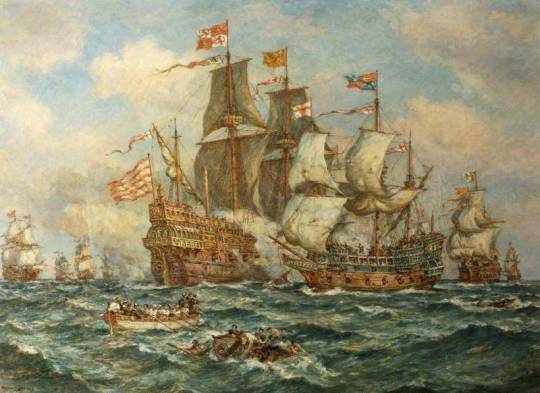
The Heroic Action of HMS Revenge against the Spanish Fleet, 1591, by Bernard Finnigan Gribble (1872–1962) (x)
"Out-gunned, out-fought, and out-numbered fifty-three to one", when the end looked certain Grenville ordered Revenge to be sunk: "Sink me the ship, Master Gunner—sink her, split her in twain! Fall into the hands of God, not into the hands of Spain! ". His officers could not agree with this order and a surrender was agreed by which the lives of the officers and crew would be spared. After an assurance of proper conduct, and having held off dozens of Spanish ships, Revenge at last surrendered. The injured Grenville died of wounds two days later aboard the Spanish flagship.
The captured but heavily damaged Revenge never reached Spain, but was lost with her mixed prize-crew of 70 Spaniards and English captives, along with a large number of the Spanish ships in a dreadful storm off the Azores. The battle-damaged Revenge was cast upon a cliff next to the island off Terceira, where she broke up completely. Between 1592 and 1593, 14 guns of the Revenge were recovered by the Spanish from the site of the wreck. Other cannons were driven ashore years later by the tide, and the last weapons raised were salvaged as late as 1625.
85 notes
·
View notes
Text



















The Citadel - BBC One - January 20, 1983 - March 24, 1983 / PBS - November, 1983 - January 1984 (Masterpiece Theatre)
Drama (10 Episodes)
Running Time: 60 minutes
Stars:
Ben Cross as Dr. Andrew Manson
David Gwillim as David Hope
Clare Higgins as Christine Barlow / Manson
Tenniel Evans as Dr. Page
Gareth Thomas as Dr. Philip Denny
Michael Cochrane as Freddie Hamson
Cynthia Grenville as Blodwen Page
Colin Baker as Richard Vaughan
Jane How as Mrs. Vaughan
Tim Wylton as Ben Chenkin
Don Fellows as Richard Stillman
Beryl Nesbitt as Annie Hughes
John Nettleton as Charles Ivory
Raymond Bowers as Dr. Llewellyn
Dilys Price as Mrs. Llewellyn
David Pugh as Joe Morgan
Dyfed Thomas as Dai Jenkins
Jack Walters as Old Thomas
Richard Davies as Dr. Watkins
Janet Davies as Mrs. Watkins
Carmen du Sautoy as Frances Lawrence
Avril Elgar as Nurse Sharp
Oliver Ford Davies as Reverend Parry
Michael Gough as Sir Jenner Halliday
Charles Kay as Mr. Hopper
Buster Merryfield as Professor Challis
John Welsh as Sir Robert Abbey
#The Citadel#TV#BBC One#Drama#1983#1980's#Ben Cross#David Gwillim#Clare Higgins#Tenniel Evans#Gareth Thomas#Michael Cochrane
3 notes
·
View notes
Text
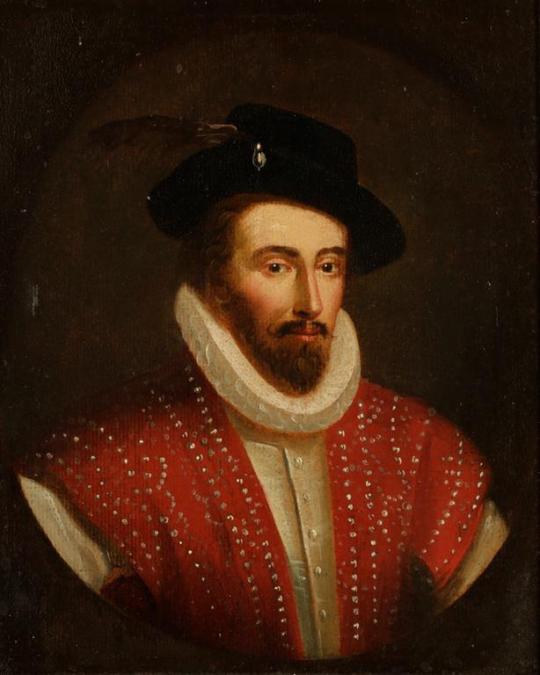
Perhaps Sherborne’s most famous former resident, Sir Walter Raleigh (c. 1554 – October, 29, 1618), was an English gentleman, writer, poet, soldier, politician, courtier, spy and explorer.
Cousin to Sir Richard Grenville and younger half-brother of Sir Humphrey Gilbert, Raleigh is famed as being the man who first brought potatoes and tobacco to England. He rose rapidly in the favour of Queen Elizabeth I and was knighted in 1585, and was instrumental in the English colonisation of North America.
Sherborne has two castles, ’Sherborne (old) Castle’ (which dates back to the twelfth century, but now stands in ruins), and ’Sherborne Lodge’ (which was built by Sir Walter Raleigh and completed in 1594); though it’s since been extended and is known today as ’Sherborne (new) Castle’ – or simply, Sherborne Castle.
It was at Sherborne Castle that Raleigh was reportedly doused with a bucket of water after a servant saw clouds of smoke coming from his pipe (a sight unseen in England before Raleigh’s introduction of tobacco), in the belief he’d been set alight; though the same story is also told of other places associated with Raleigh, including his house in Ireland, the Virginia Ash Inn in Henstridge near Sherborne, and South Wraxall Manor in Wiltshire, home of Raleigh’s friend Sir Walter Long.
Having fallen from favour with the Queen, Raleigh retired to his estate at Sherborne; though he was later executed by King James I.
12 notes
·
View notes
Photo

Lanhydrock House and Gardens, Cornwall by photphobia The great house stands in extensive grounds (360 hectares or 890 acres) above the River Fowey and it has been owned and managed by the National Trust since 1953. Much of the present house dates back to Victorian times but some sections date from the 1620s. It is a Grade I listed building and is set in gardens with formal areas. The hill behind the house is planted with a fine selection of shrubs and trees. Lanhydrock estate belonged to the Augustinian priory of St Petroc at Bodmin but the Dissolution of the Monasteries during the 1530s saw it pass into private hands. In 1620 wealthy merchant Sir Richard Robartes, of Truro, acquired the estate and began building Lanhydrock House, designed to a four-sided layout around a central courtyard and constructed of grey granite. Robartes died in 1624 but work on the building was continued by his son John Robartes, 1st Earl of Radnor, a notable public figure who served as Lord Privy Seal and Lord President of the Council. The embattled walls were built of rude (rough), massive granite blocks with years 1636 and 1642 on the walls, indicating when they were built. A barbican gate was added and the house was garrisoned by Parliamentary forces in August 1644 when Sir Richard Grenville took possession. Lanhydrock is a civil parish centred on a country estate and mansion in Cornwall, United Kingdom. The parish lies south of the town of Bodmin and is bounded to the north by Bodmin parish, to the south by Lanlivery parish and to the west by Lanivet parish. The parish church is dedicated to St Hydroc and stands in the grounds of Lanhydrock House. Parts date back to the late 15th century and the church has a chancel, nave, north and south aisles and three-stage battlemented tower with nine bells. Eight bells date from the late 19th century and are regularly rung. The ninth bell dates from circa 1599 and is only rung infrequently for tolling. https://flic.kr/p/2cDqiCp
2 notes
·
View notes
Text
The Night They Drove Old Dixie Down - Today In Southern History
9 April 1865
On this date in 1865…
Overwhelming firepower and numbers left Confederate General Robert E. Lee little choice but to surrender the remaining 26,765 men of the Army of Northern Virginia to federal General Ulysses S. Grant at Appomattox Court House, Virginia.
Other Years:
1585 – Sir Richard Grenville’s fleet departed Plymouth, England with five main ships: the Tiger (Grenville’s),…

View On WordPress
0 notes
Text
The Revenge: A Ballad of the Fleet
At Flores in the Azores Sir Richard Grenville lay,
And a pinnace, like a fluttered bird, came flying from far away:
"Spanish ships of war at sea! we have sighted fifty-three!"
Then sware Lord Thomas Howard: "'Fore God I am no coward;
But I cannot meet them here, for my ships are out of gear,
And the half my men are sick. I must fly, but follow quick.
We are six ships of the line; can we fight with fifty-three?"
Then spake Sir Richard Grenville: "I know you are no coward;
You fly them for a moment to fight with them again.
But I've ninety men and more that are lying sick ashore.
I should count myself the coward if I left them, my Lord Howard,
To these Inquisition dogs and the devildoms of Spain."
So Lord Howard passed away with five ships of war that day,
Till he melted like a cloud in the silent summer heaven;
But Sir Richard bore in hand all his sick men from the land
Very carefully and slow,
Men of Bideford in Devon,
And we laid them on the ballast down below;
For we brought them all aboard,
And they blest him in their pain, that they were not left to Spain,
To the thumbscrew and the stake, for the glory of the Lord.
He had only a hundred seamen to work the ship and to fight,
And he sailed away from Flores till the Spaniard came in sight,
With his huge sea-castles heaving upon the weather bow.
"Shall we fight or shall we fly?
Good Sir Richard, tell us now,
For to fight is but to die!
There'll be little of us left by the time this sun be set."
And Sir Richard said again: "We be all good English men.
Let us bang these dogs of Seville, the children of the devil,
For I never turned my back upon Don or devil yet."
Sir Richard spoke and he laughed, and we roared a hurrah, and so
The little Revenge ran on sheer into the heart of the foe,
With her hundred fighters on deck, and her ninety sick below;
For half of their fleet to the right and half to the left were seen,
And the little Revenge ran on through the long sea-lane between.
Thousands of their soldiers looked down from their decks and laughed,
Thousands of their seamen made mock at the mad little craft
Running on and on, till delayed
By their mountain-like San Philip that, of fifteen hundred tons,
And up-shadowing high above us with her yawning tiers of guns,
Took the breath from our sails, and we stayed.
And while now the great San Philip hung above us like a cloud
Whence the thunderbolt will fall
Long and loud,
Four galleons drew away
From the Spanish fleet that day,
And two upon the larboard and two upon the starboard lay,
And the battle-thunder broke from them all.
But anon the great San Philip, she bethought herself and went
Having that within her womb that had left her ill content;
And the rest they came aboard us, and they fought us hand to hand,
For a dozen times they came with their pikes and musqueteers,
And a dozen times we shook 'em off as a dog that shakes his ears
When he leaps from the water to the land.
And the sun went down, and the stars came out far over the summer sea,
But never a moment ceased the fight of the one and the fifty-three.
Ship after ship, the whole night long, their high-built galleons came,
Ship after ship, the whole night long, with her battle-thunder and flame;
Ship after ship, the whole night long, drew back with her dead and her shame.
For some were sunk and many were shattered, and so could fight us no more -
God of battles, was ever a battle like this in the world before?
For he said "Fight on! fight on!"
Though his vessel was all but a wreck;
And it chanced that, when half of the short summer night was gone,
With a grisly wound to be dressed he had left the deck,
But a bullet struck him that was dressing it suddenly dead,
And himself he was wounded again in the side and the head,
And he said "Fight on! fight on!"
And the night went down, and the sun smiled out far over the summer sea,
And the Spanish fleet with broken sides lay round us all in a ring;
But they dared not touch us again, for they feared that we still could sting,
So they watched what the end would be.
And we had not fought them in vain,
But in perilous plight were we,
Seeing forty of our poor hundred were slain,
And half of the rest of us maimed for life
In the crash of the cannonades and the desperate strife;
And the sick men down in the hold were most of them stark and cold,
And the pikes were all broken or bent, and the powder was all of it spent;
And the masts and the rigging were lying over the side;
But Sir Richard cried in his English pride,
"We have fought such a fight for a day and a night
As may never be fought again!
We have won great glory, my men!
And a day less or more
At sea or ashore,
We die -does it matter when?
Sink me the ship, Master Gunner -sink her, split her in twain!
Fall into the hands of God, not into the hands of Spain!"
And the gunner said "Ay, ay," but the seamen made reply:
"We have children, we have wives,
And the Lord hath spared our lives.
We will make the Spaniard promise, if we yield, to let us go;
We shall live to fight again and to strike another blow."
And the lion there lay dying, and they yielded to the foe.
And the stately Spanish men to their flagship bore him then,
Where they laid him by the mast, old Sir Richard caught at last,
And they praised him to his face with their courtly foreign grace;
But he rose upon their decks, and he cried:
"I have fought for Queen and Faith like a valiant man and true;
I have only done my duty as a man is bound to do:
With a joyful spirit I Sir Richard Grenville die!"
And he fell upon their decks, and he died.
And they stared at the dead that had been so valiant and true,
And had holden the power and glory of Spain so cheap
That he dared her with one little ship and his English few;
Was he devil or man? He was devil for aught they knew,
But they sank his body with honour down into the deep,
And they manned the Revenge with a swarthier alien crew,
And away she sailed with her loss and longed for her own;
When a wind from the lands they had ruined awoke from sleep,
And the water began to heave and the weather to moan,
And or ever that evening ended a great gale blew,
And a wave like the wave that is raised by an earthquake grew,
Till it smote on their hulls and their sails and their masts and their flags,
And the whole sea plunged and fell on the shot-shattered navy of Spain,
And the little Revenge herself went down by the island crags
To be lost evermore in the main.
0 notes
Text
The Revenge by Tennyson
The Revenge: A Ballad of the Fleet
by Alfred, Lord Tennyson
Monamy, Peter; Ships in Distress in a Storm; Tate; Public Domain.
At Flores in the Azores Sir Richard Grenville lay,
And a pinnace, like a flutter’d bird, came flying from far away.
‘Spanish ships of war at sea! We have sighted fifty three!’
Then sware Lord Thomas Howard: ‘’Fore God I am no coward;
But I cannot meet them here, for my…
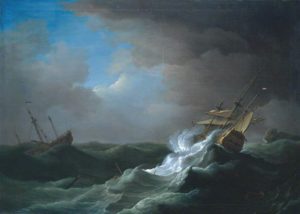
View On WordPress
0 notes
Photo

Richard Grenville
Sir Richard Grenville (1542-1591) était un aventurier, un marin et un corsaire élisabéthain dont l'histoire est aussi divertissante que celle de n'importe quel marin fictif. Au début de sa carrière, il devint membre du Parlement, soldat en Hongrie et propriétaire de plantations en Irlande. Grenville emmena les premiers colons anglais en Amérique du Nord en 1585, combattit l'Armada espagnole en 1588 et se battit à nouveau contre les Espagnols en 1591, cette fois à bord de son navire, le Revenge, aux Açores. Le Revenge, qui se battit seul contre une flotte de 56 navires espagnols, coula deux des navires ennemis et en endommagea beaucoup d'autres, mais il finit par céder, et Grenville succomba à ses blessures. Cet épisode est entré dans la légende et a été célébré dans l'art, la littérature et la tradition maritime pendant des siècles.
Lire la suite...
1 note
·
View note
Text
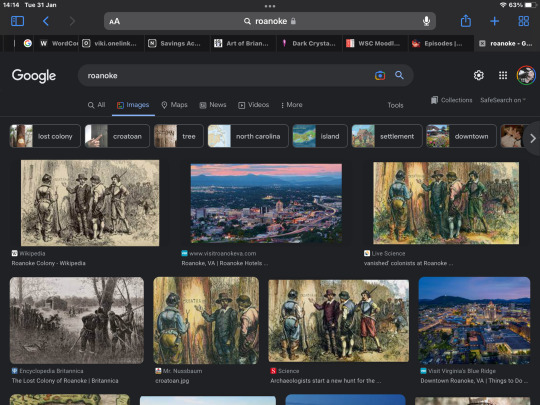

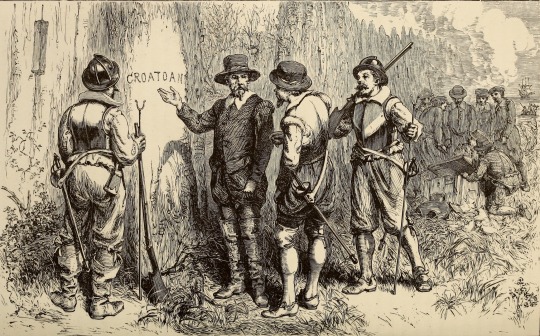
Roanoke.
The establishment of the Roanoke Colony (/ˈroʊənoʊk/ ROH-ə-nohk) was an attempt by Sir Walter Raleigh to found the first permanent English settlement in North America. The English, led by Sir Humphrey Gilbert, had briefly claimed St. John's, Newfoundland, in 1583 as the first English territory in North America at the royal prerogative of Queen Elizabeth I, but Gilbert was lost at sea on his return journey to England.
Roanoke colony was founded by governor Ralph Lane in 1585 on Roanoke Island in what is now Dare County, North Carolina, United States.[1](pp 45, 54–59) Lane's colony was troubled by a lack of supplies and poor relations with the local Native Americans. While awaiting a delayed resupply mission by Sir Richard Grenville, Lane abandoned the colony and returned to England with Sir Francis Drake in 1586. Grenville arrived two weeks later and also returned home, leaving behind a small detachment to protect Raleigh's claim.[1](pp 70–77)
Following the failure of the 1585 settlement, a second expedition, led by John White, landed on the same island in 1587, and set up another settlement. Sir Walter Raleigh had sent him to establish the "Cittie of Raleigh" in Chesapeake Bay. That attempt became known as the Lost Colony due to the subsequent unexplained disappearance of its population.[1](pp xx, 89, 276)
During a stop to check on Grenville's men, flagship pilot Simon Fernandes forced White and his colonists to remain on Roanoke.[1](pp 81–82, 89) White returned to England with Fernandes, intending to bring more supplies back for his colony in 1588.[1](pp 93–94) The Anglo-Spanish War delayed White's return to Roanoke until 1590,[1](pp 94, 97) and upon his arrival he found the settlement fortified but abandoned. The cryptic word "CROATOAN" was found carved into the palisade, which White interpreted to mean the colonists had relocated to Croatoan Island. Before White could follow this lead, rough seas and a lost anchor forced the mission to return to England.[1](pp 100–03)
The fate of the approximately 112–121 colonists remains unknown. Speculation that they had assimilated with nearby Native American communities appears in writings as early as 1605.[1](pp 113–114) Investigations by the Jamestown colonists produced reports that the Roanoke settlers had been massacred and stories of people with European features in Native American villages, but no hard evidence was produced.[1](pp 116–125)
This relates to our project because we have 2 Colony’s ships going into space to find a new planet to live on. The first one finds a planet and takes some lovely pictures for their photo album, but something might happen to them, they might all get either killed by the animals on that planet or the atmosphere might drive them insane to the point they either kill each other of kill the self’s. Either easy they could end up mysteriously disappearing just like the Colony of Roanoke.
0 notes
Text


The Revenge during the 1591 Battle of Flores in the Azores, by Charles Edward Dixon.
#the revenge#battle of flores#sir richard grenville#richard grenville#island of flores#flores#azores#history#england#spain#treasure#fleet#spanish#english#ships#warships#revenge#spanish empire#art#painting#last stand#last fight#charles dixon#british
23 notes
·
View notes
Text
reading list - historical fiction
CLICK HERE TO ACCESS MY OTHER READING LISTS.
✵ ACTIVELY UPDATING ✵
☐ AKILAN – Vengayin maindan
☐ ALENCAR, José de – Iracema
☐ ALENCAR, José de – O Guarani
☐ ALLENDE, Isabel – La Isla Bajo el Mar
☐ ANDRIĆ, Ivo – The Bridge on the Drina
☐ ATWOOD, Margaret – Alias Grace
☐ ATWOOD, Margaret – The Blind Assassin
☐ BARICCO, Alessandro – Seta
☐ BOYDEN, Joseph – Three Day Road
☐ BOYDEN, Joseph – The Orenda
☐ BUCK, Pearl S. – East Wind: West Wind
☐ BUCK, Pearl S. – The House of Earth Trilogy
☐ BUCK, Pearl S. – China Trilogy
☐ BUCK, Pearl S. – Dragon Seed & The Promise
☐ BUCK, Pearl S. – Pavilion of Women
☐ BUCK, Pearl S. – Peony
☐ BULGAKOV, Mikhail – The White Guard
☐ BURTON, Jessie – The Minaturist
☐ BUTT, Razia – Bano
☐ CAREY, Peter – Jack Maggs
☐ CAREY, Peter – Oscar and Lucinda
☐ CAREY, Peter – True History of the Kelly Gang
☐ CARPENTIER, Alejo – El reino de este mundo
☐ CATHER, Willa – Death Comes for the Archbishop
☐ CATTON, Eleanor – The Luminaries
☐ CERVANTES SAAVEDRA, Miguel de – El Ingenioso Hidalgo Don Quixote de la Mancha
☐ CHATTOPADHYAY, Bankim Chandra – Durgeshnandini
☐ CHATTOPADHYAY, Bankim Chandra – Anandamath
☐ CHEVALIER, Tracy – Girl with a Pearl Earring
☐ CHOY, Wayson – The Jade Peony
☐ CHOY, Wayson – All That Matters
☐ CLAUS, Hugo – Het verdriet van België
☐ CLAVELL, James – The Asian Saga
☐ COETZEE, J. M. – Waiting for the Barbarians
☐ CONIGLIO, Angelo F. – La Ruotaia
☐ CONRAD, Joseph – The Rover
☐ COOPER, James Fenimore – Leatherstocking Tales Pentology
☐ COSTER, Charles De – La Légende...d'Ulenspiegel et de Lamme Goedzak...
☐ CRANE, Stephen – The Red Badge of Courage
☐ DAVIS, Lindsey – Falco series
☐ DeLILLO, Don – Libra
☐ de MADARIAGA, Salvador – El corazón de piedra verde
☐ DICKENS, Charles – A Tale of Two Cities
☐ DOCTOROW, E. L. – Ragtime
☐ DONALD, Angus – Outlaw Chronicles
☐ DRUON, Maurice – Les Rois maudits
☐ DUMAS, Alexandre (père) – The DÁrtagnan Romances
☐ DUMAS, Alexandre (père) – Le Comte de Monte-Cristo
☐ DUMAS, Alexandre (père) – La Tulipe Noire
☐ ECO, Umberto – Il nome della rosa
☐ ECO, Umberto – I'isola del giorno prima
☐ ECO, Umberto – Baudolino
☐ ECO, Umberto – La Misteriosa Fiamma della Regina Loana
☐ ECO, Umberto – Il cimitero di Praga
☐ ELIOT, George – Romola
☐ ELIOT, George – Middlemarch
☐ ENDŌ, Shūsaku – Chinmoku
☐ FARRELL, J. G. – The Siege of Krishnapur
☐ FARRELL, J. G. – Troubles
☐ FAST, Howard – Spartacus
☐ FOWLES, John – The French Lieutenant's Woman
☐ FRASER, George MacDonald – Flashman
☐ GEDGE, Pauline – Scroll of Saqqara
☐ GHOSH, Amitav – Ibis Trilogy
☐ GOLON, Anne – Angélique series
☐ GRAVES, Robert – I, Claudius
☐ GRENVILLE, Kate – The Secret River
☐ HAGGARD, Sir H. Rider – King Solomon's Mines
☐ HARRIS, Robert – An Officer and a Spy
☐ HELLER, Joseph – Catch-22
☐ HIJĀZĪ, Nasīm – Khaak aur Khoon
☐ HILL, Lawrence – The Book of Negroes
☐ HOLLAND, Cecelia – City of God
☐ HOLLAND, Cecelia – The Lords of Vaumartin
☐ HUGO, Victor – Quatrevingt-treize
☐ HUGO, Victor – Les Misérables
☐ HYDER, Qurratulain – Aag Ka Darya
☐ IBÁÑEZ, Vicente Blasco – Los cuatro jinetes del Apocalipsis
☐ IRVING, Washington – Tales of the Alhambra
☐ JENNINGS, Gary – Aztec
☐ JENNINGS, Gary – Aztec Autumn
☐ JENNINGS, Gary – Raptor
☐ JIN YONG – all works
☐ JOAQUIN, Nick – The Woman Who Had Two Navels
☐ JOHNSTON, Wayne – The Colony of Unrequited Dreams
☐ JOSÉ, Francisco Sionil – Po-on
☐ JUAN MANUEL, Don – Libro do los enxiemplos del Conde Lucanor et de Patronio
☐ KADARE, Ismail – Gjenerali i ushtrisë së vdekur
☐ KANEKAR, Amita – A Spoke in the Wheel
☐ KAYE, M. M. – The Far Pavilions
☐ KENEALLY, Thomas – Bring Larks and Heroes
☐ KENNEDY, William – Albany Cycle
☐ KIDD, Sue Monk – The Secret Life of Bees
☐ KINGSLEY, Charles – Westward Ho!
☐ KRISHNAMURTHY, Kalki – Parthiban Kanavu
☐ KRISHNAMURTHY, Kalki – Sivagamiyin Sabatham
☐ KRISHNAMURTHY, Kalki – Ponniyin Selvan
☐ LEONARDOS, George – Palaiologan Dynasty series
☐ LITTELL, Jonathan – Les Bienveillantes
☐ LISS, David – The Coffee Trader
☐ LOWRY, Lois – Number the Stars
☐ MALRAUX, Georges André – Les Conquérants
☐ MALRAUX, Georges André – La Voie Royale
☐ MALRAUX, Georges André – La condition humaine
☐ MANTEL, Hilary – A Place of Greater Safety
☐ MANZONI, Alessandro – I promessi sposi
☐ MARTINEZ, Tomás Eloy – Santa Evita
☐ MASTOOR, Khadija – Aangan
☐ McCORMMACH, RUSSELL – Night Thoughts of a Classical Physicist
☐ McCARTHY, Cormac – Blood Meridian
☐ MEHTA, Nandshankar – Karan Ghelo
☐ MICHENER, James A. – all works
☐ MIKSZÁTH, Kálmán – A fekete város
☐ MIN, Anchee – Wild Ginger
☐ MITCHELL, David – The Thousand Autumns of Jacob de Zoet
☐ MITCHELL, Margaret – Gone with the Wind
☐ MORANTE, Elsa – La Storia
☐ MORRISON, Toni – Beloved
☐ MORRISON, Toni – Jazz
☐ MULTATULI – Max Havelaar
☐ NEWTON, Nerida – The Lambing Flat
☐ NINH, Bảo – Nỗi buồn chiến tranh
☐ OKSANEN, Sofi – Puhdistus
☐ ONDAATJE, Michael – In the Skin of a Lion
☐ PATTERSON, James & GROSS, Andrew – The Jester
☐ PENNER, Sarah – The Lost Apothecary
☐ PÉREZ-REVERTE, Arturo – Captain Alatriste novels
☐ PÉREZ-REVERTE, Arturo – Falcó novels
☐ PÉREZ-REVERTE, Arturo – El maestro de esgrima
☐ PÉREZ-REVERTE, Arturo – La Reina del Sur
☐ PÉREZ-REVERTE, Arturo – El pintor de batallas
☐ PHILLIPS, Arthur – Prague
☐ PHILLIPS, Arthur – The King at the Edge of the World
☐ PILLAI, C. V. Raman – novel trilogy
☐ POPE, Barbara Corrado – Cézanne's Quarry
☐ POPE, Barbara Corrado – The Blood of Lorraine
☐ POPE, Barbara Corrado – The Missing Italian Girl
☐ PRAMOEDYA, Ananta Toer – Buru Quartet
☐ PRESSFIELD, Steven – Gates of Fire
☐ PRESSFIELD, Steven – Tides of War
☐ PRESSFIELD, Steven – The Afghan Campaign
☐ PRUS, Bolesław – Faraon
☐ PUZO, Mario – The Godfather universe
☐ PUZO, Mario – The Family
☐ PYNCHON, Thomas – Gravity's Rainbow
☐ PYNCHON, Thomas – Mason & Dixon
☐ READE, Charles – The Cloister and the Hearth
☐ RENAULT, Mary – The Last of the Wine
☐ RENAULT, Mary – The Mask of Apollo
☐ RENAULT, Mary – The King Must Die
☐ RICHARDS, D. Manning – Destiny in Sydney
☐ RIZAL, José – Noli Me Tángere
☐ RIZAL, José – El filibusterismo
☐ RUSHDIE, Salman – Midnight's Children
☐ RUTHERFURD, Edward – Russka
☐ SABATO, Ernesto – Sobre héroes y tumbas
☐ SANGHI, Ashwin – Chanakya's Chant
☐ SANKRITYAYAN, Rahul – Volga Se Ganga
☐ SARAMAGO, José – Memorial do Convento
☐ SATYANARAYANA, Viswanatha – Veyi Padagalu
☐ SCOTT, Sir Walter – Quentin Durward
☐ SCOTT, Sir Walter – Tales of the Crusaders
☐ SCOTT, Sir Walter – Ivanhoe
☐ SHAN, Sa – Porte de la paix céleste
☐ SHAN, Sa – La Joueuse de go
☐ SHAN, Sa – La cithare nue
☐ SIENKIEWICZ, Henryk – The Trilogy
☐ SMILEY, Jane – The Greenlanders
☐ SOMOZA, José Carlos – La caverna de las ideas
☐ STEPHENSON, Neal – Cryptonomicon
☐ STIFTER, Adalbert – Witiko
☐ STYRON, William – Sophie's Choice
☐ TOLSTOY, Leo – War and Peace
☐ TOMASI, Giuseppe (di Lampedusa) – Il Gattopardo
☐ TREMAYNE, Peter – Sister Fidelma mysteries
☐ UNDSET, Sigrid – Kristin Lavransdatter
☐ UNDSET, Sigrid – Olav Audunssøn novels
☐ VARGAS LLOSA, Mario – La guerra del fin del mundo
☐ VARGAS LLOSA, Mario – La Fiesta del Chivo
☐ VIDAL, Gore – Narratives of Empire
☐ WALLACE, Lew – Ben-Hur: A Tale of the Christ
☐ WALTARI, Mika – Sinuhe egyptiläinen
☐ WALTARI, Mika – Mikael Karvajalka
☐ WILDER, Thornton – The Bridge of San Luis Rey
☐ WOOLF, Virginia – Orlando: A Biography
☐ YERBY, Frank – Goat Song
☐ YOURCENAR, Marguerite – L'Œuvre au noir
☐ ŻEROMSKI, Stefan – Wierna rzeka
☐ ZIMLER, Richard – The Warsaw Anagrams
☐ ZIMLER, Richard – The Last Kabbalist of Lisbon
☐ ZUSAK, Markus – The Book Thief
#books#literature#reading list#what to read#fiction#stories#historical fiction#academia#give me recommendations
25 notes
·
View notes
Text
The Race between HMS Pickle and HMS Nautilus
It took over two weeks for the Admiralty to receive the news of Britain’s great victory at the Battle of Trafalgar- and the tragic death of Lord Horatio Nelson. Admiral Collingwood, who took over as commander-in-chief, wrote his dispatches on the morning of the day after the battle, but owing to a storm and the immediate needs of the fleet it was foor days before he was able to send them. On 26 October 1805 Collingwood summoned Lieutenant John Lapenotiere, in command of the schooner Pickle, the fastest vessel then at his disposal, and ordered him to sail to Plymouth with the dispatches and with all haste proceed to the Admiralty . If there were difficulties he was to make the first port he could and the go on to London.

H.M.S. Pickle under the command of Lieutenant John Lapenotièr brings back to England news of the great victory off Cape Trafalgar on the 21st October 1805 and that of the sad loss of Lord Nelson, by Richard Grenville (x)
Being the bearer of offical news of victory was a much- coveted role, as there would inevitable be promotion and financial reward. But in carrying out his duties, Lapenotiere was nearly frustrated by the actions of another naval officer. En route back to England HM sloop Nautilus was sighted and Lapenotiere told her commander John Sykes the momentous news. Sykes immediately sailed for Lisbon to inform the British consul, then unknown to Lapenotiere he headed directly for London. An unofficial race for glory had begun. On 4 November Lapenotiere was forced by weather conditions to land at the Cornish port of Falmouth. He hired a chaise for the for the first stage of his overland dash, improvising a broomstick for a flagpole on which he flew a Union Jack above a tattered tricolore. Not long after, Skyes landed at Plymouth, further along the coast, and he too hired a cariage.
Lapenotiere’s journey of 425 km took 21 changes of horses and carriages and his expenses amounted to £46 19 s. 1d.- nearly half of his annual salary.

From Falmouth to London, Lt Lapenotiere changes horses at least 21 times in his extraordinary journey which takes just over 36 hours (x)
Finally the coach clattered into the Admiralty courtyard at 1 a.m. in the morning 6 November, over 36 hours after Lapenotiere had left Flamouth. It was a neck and neck race to the very end as Lapenotiere entered the vestibule of the Admiralty less than one hour before Sykes.
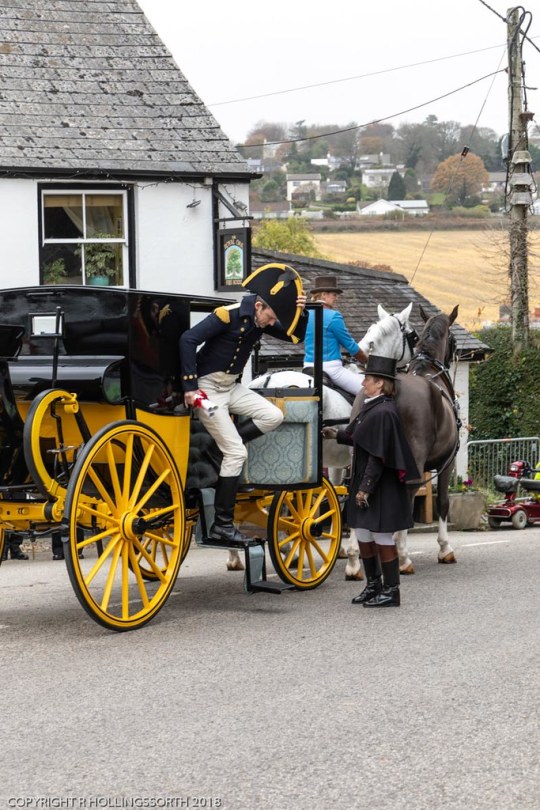
Reenactment of the Arrival of Lieutenant John Richards Laoenotiere at Perrawell on his way to London (x)
Most of the officials had long since retired for the night but William Marsden, secretary of the Navy Board, was on his way to his private apartments having just finished work in the board room. Lapenotiere handed over the dispatches with the simple words, “ Sir we have gained a great victory. But we have lost Lord Nelson.” Lapenotiere was later presented to King George, who bade him accept a token and presented him with the closest thing to hand, a silver cruet. Pickles captain became inextricably linked with the death of Nelson for ever, while Sykes is now nothing more than a historical footnote.
117 notes
·
View notes
Text
Solomon Kane’s Homecoming
by Robert E. Howard
The white gulls wheeled above the cliffs,
the air was slashed with foam,
The long tides moaned along the strand
when Solomon Kane came home.
He walked in silence strange and dazed
through the little Devon town,
His gaze, like a ghost’s come back to life,
roamed up the streets and down.
The people followed wonderingly
to mark his spectral stare,
And in the tavern silently
they thronged about him there.
He heard as a man hears in a dream
the worn old rafters creak,
And Solomon lifted his drinking-jack
and spoke as a ghost might speak:
“There sat Sir Richard Grenville once;
in smoke and flame he passed,
“And we were one to fifty-three,
but we gave them blast for blast.
“From crimson dawn to crimson dawn,
we held the Dons at bay.
“The dead lay littered on our decks,
our masts were shot away.
“We beat them back with broken blades,
till crimson ran the tide;
“Death thundered in the cannon smoke
when Richard Grenville died.
“We should have blown her hull apart
and sunk beneath the Main.”
The people saw upon his wrists
the scars of the racks of Spain.
“Where is Bess?” said Solomon Kane.
“Woe that I caused her tears.”
“In the quiet churchyard by the sea
she has slept these seven years.”
The sea-wind moaned at the window-pane,
and Solomon bowed his head.
“Ashes to ashes and dust to dust,
and the fairest fade,” he said.
His eyes were mystical deep pools
that drowned unearthly things,
And Solomon lifted up his head
and spoke of his wanderings.
“Mine eyes have looked on sorcery
in the dark and naked lands,
“Horror born of the jungle gloom
and death on the pathless sands.
“And I have known a deathless queen
in a city old as Death,
“Where towering pyramids of skulls
her glory witnesseth.
“Her kiss was like an adder’s fang,
with the sweetness Lilith had,
“And her red-eyed vassals howled for blood
in that City of the Mad.
“And I have slain a vampire shape
that sucked a black king white,
“And I have roamed through grisly hills
where dead men walked at night.
“And I have seen heads fall like fruit
in the slaver’s barracoon,
“And I have seen winged demons fly
all naked in the moon.
“My feet are weary of wandering
and age comes on apace;
“I fain would dwell in Devon now,
forever in my place.”
The howling of the ocean pack
came whistling down the gale,
And Solomon Kane threw up his head
like a hound that snuffs a trail.
A-down the wind like a running pack
the hounds of the ocean bayed,
And Solomon Kane rose up again
and girt his Spanish blade.
In his strange cold eyes a vagrant gleam
grew wayward and blind and bright,
And Solomon put the people by
and went into the night.
A wild moon rode the wild white clouds,
the waves in white crests flowed,
When Solomon Kane went forth again
and no man knew his road.
They glimpsed him etched against the moon,
where clouds on hilltop thinned;
They heard an eery echoed call
that whistled down the wind.
4 notes
·
View notes
Photo
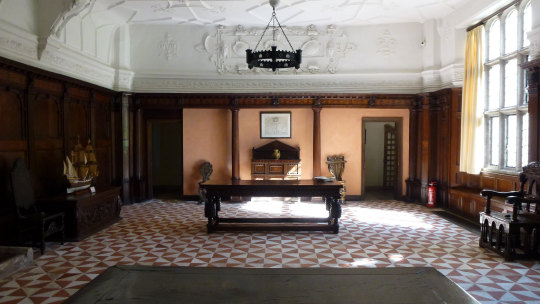
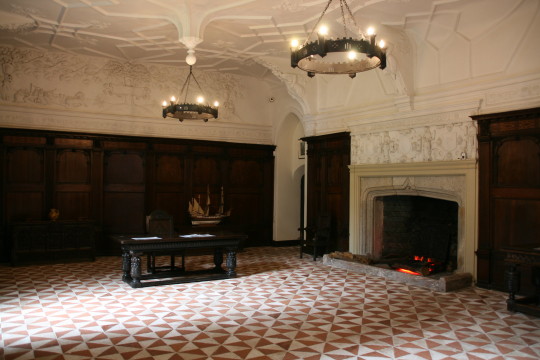




Interiors of Buckland Abbey, Devon. It was originally a Cistercian monastery, founded in 1278, and sold to Sir Richard Grenville in 1541 after the Dissolution of the Monasteries. He, his son and later grandson greatly altered the building to make it a private residence, completing the work only in the 1570s. In 1581 it was sold to Sir Francis Drake and was his home for fifteen years. It is now operated by the National Trust.
99 notes
·
View notes
Text
So, today’s bit of largely overlooked British history for you is the Prayer Book Rebellion or Western Rising, or in Cornish Rebellyans an Lyver Pejadow Kebmyn. This happened in 1549, when Edward VI was on the throne.
My favourite thing about it is their slogan of “Kill All the Gentlemen” (speaking about gentlemen as a class), which is really the “Eat the Rich” of it’s time.
Although the rebellion was triggered due to the introduction of an English Prayer Book, and was partly motivated by a desire to keep Catholic rituals in place, there were also a lot of economic factors involved. During this period, more and more common land was being enclosed. People in the Westcountry were suffering due to a new Poll Tax on sheep. There had also been a sharp increase in the price of wheat, which caused further economic hardship.
However, the rebellion was also triggered specifically by pro-catholic sentiment as well as Cornish seperatism. The Catholic Church in Cornwall has always been accomadating of the Cornish, celtic culture, and at the time most people in Cornwall still spoke Cornish, with many in the West not speaking English. They saw the imposition of English services and English prayer as a cultural attack, in a way that Latin services were not. There was also historic anger over the destruction of Glasney College and Crantock College which were local monestaries.
Initially, the rebellion was quite successful. The rebels captured St Micheal’s Mount, and Trematon Castle (taking Sir Richard Grenville prisoner).
The Cornish Rebels met with a force of Catholics from Devon outside Exeter, and laid siege to the city.
However, after several battles, in which somewhere between 2000 and 5000 rebels were killed and the leaders of the rebellion were cancelled.
Following this, the Cornish language, and ideas of Cornish nationhood were repressed. The loss of life, and the fact there was never a translation of the prayerbook into Cornish is thought to have been a turning point for the Cornish language, and part of the reason it did not survive into the present day, like Welsh.
This was really quite a significant event at the time- but it wasn’t touched on during History lessons at school- despite the fact that I went to secondary school in Cornwall.
#Uk history#cornish history#cornish language#cornish culture#western rising#rebellions#catholicism#catholic rebellions#cornwall#prayer book rebellion
30 notes
·
View notes
Photo

1571 Unknown artist (copy after) - Sir Richard Grenville
(National Portrait Gallery, London)
138 notes
·
View notes